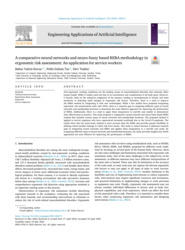A comparative neural networks and neuro-fuzzy based REBA methodology in ergonomic risk assessment: An application for service workers
-
Yazar
Bahar Yalçın Kavuş
-
Tür
Makale
- Yayın Yılı 2023
- Veritabanları Wos,Scopus
- DOI 10.1016/j.engappai.2023.106373
-
Yayıncı
Elsevier
- Dergi Engineering Applications of Artificial Intelligence 123, pp.1 - 17
- Tek Biçim Adres https://hdl.handle.net/20.500.14081/1886
-
Konu Başlıkları
Artificial neural networks
Rapid Entire Body Assessment
Ergonomic
Service employees
Non-ergonomic working conditions are the leading causes of musculoskeletal disorders that seriously affect human health. REBA is widely used tool due to its convenience and consideration of all body parts. However, it heavily relies on the subjective judgments of the assessor, leading to inconsistencies in results, and lacks sensitivity in detecting small changes in ergonomic risk factors. Therefore, there is a need to improve the REBA method by integrating it with new technologies. While a few studies have proposed integrating ergonomic risk measurement tools with ANNs, there is a research gap in comparing different types of neural networks and membership functions to determine the most effective approach for improving the performance of REBA. Additionally, there is a need to apply these integrations to real-life case studies to demonstrate their effectiveness in practice. This study proposes a comparative neural network and neuro-fuzzy-based REBA method that includes various types of neural networks and membership functions. The proposed method is applied to service employee who have experienced increased workloads due to the Covid-19 pandemic. The results show that the neuro-fuzzy method is more accurate than the REBA and provides greater flexibility in defining which member belongs to which risk level cluster. This study is critical because it addresses research gaps in integrating neural networks and REBA and applies these integrations to a real-life case study. By comparing different types of neural networks and membership functions, the study provides insights into which approaches are most effective for improving the performance of REBA.
-
Koleksiyonlar
Fakülteler
Mühendislik Fakültesi


 Tam Metin
Tam Metin

